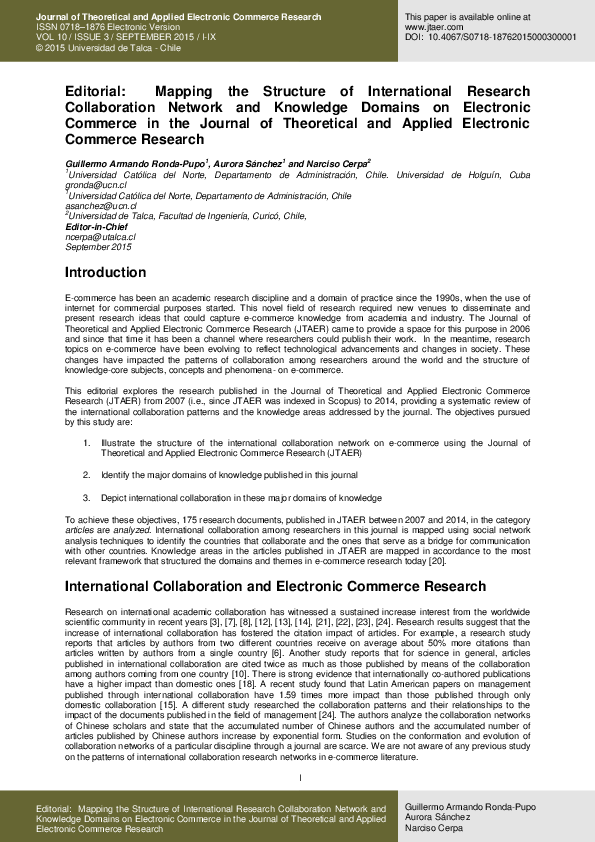Manufacturer Encroachment on a Sustainable Supply Chain under Asymmetric Green Information
IF 5.1
3区 管理学
Q1 BUSINESS
Journal of Theoretical and Applied Electronic Commerce Research
Pub Date : 2024-08-26
DOI:10.3390/jtaer19030103
引用次数: 0
Abstract
This paper investigates manufacturer encroachment on a sustainable supply chain, where the manufacturer holds exclusive information on product greenness and is responsible for both corporate social responsibility (CSR) and greening. The manufacturer and the retailer play a signaling game whereby CSR effort and wholesale price serve as joint green signals. Findings reveal that, firstly, encroachment induces higher CSR efforts from manufacturers. When customers exhibit a strong CSR preference, the resulting CSR increment leads to increased offline demand and drives up both wholesale and retail prices in a mutually beneficial manner. This phenomenon is referred to as the CSR effect, yielding a win-win encroachment. Secondly, when signaling product greenness to highly CSR-sensitive customers, the high-greenness manufacturer principally distorts her CSR effort downward to an extent unprofitable for the low-greenness manufacturer to mimic and subordinately distorts the wholesale price downward to counter CSR-induced demand decrement and mitigate CSR cost pass-through downstream. Finally, the win-win encroachment pattern is characterized by encroachment profit and signal expense sharing, with encroachment strengthening downward-distorted signaling while signaling weakens the CSR effect. These insights contribute valuable guidance for green manufacturers in CSR decision-making, which functions as a component of green signaling and facilitates transitioning to dual-channel sustainable supply chains.不对称绿色信息下制造商对可持续供应链的蚕食
本文研究了制造商蚕食可持续供应链的问题,在这种情况下,制造商掌握着产品绿色程度的独家信息,并同时负责企业社会责任(CSR)和绿化工作。制造商和零售商进行信号博弈,将企业社会责任努力和批发价格作为共同的绿色信号。研究结果表明:首先,蚕食会促使制造商提高企业社会责任。当顾客表现出强烈的企业社会责任偏好时,由此产生的企业社会责任增量会导致线下需求增加,并以互利的方式推动批发价和零售价上涨。这种现象被称为企业社会责任效应,产生了双赢的侵占效应。其次,当向对企业社会责任高度敏感的客户发出产品绿色化的信号时,高绿色化生产商主要向下扭曲其企业社会责任努力,使低绿色化生产商模仿无利可图,并次要向下扭曲批发价格,以抵消企业社会责任引起的需求下降,并减轻企业社会责任成本向下游的转嫁。最后,双赢侵占模式的特点是侵占利润和信号费用共享,侵占加强了向下扭曲的信号传递,而信号传递削弱了企业社会责任效应。这些见解为绿色制造商的企业社会责任决策提供了有价值的指导,而企业社会责任作为绿色信号的一个组成部分,有助于向双通道可持续供应链过渡。
本文章由计算机程序翻译,如有差异,请以英文原文为准。
求助全文
约1分钟内获得全文
求助全文
来源期刊
CiteScore
9.50
自引率
3.60%
发文量
67
期刊介绍:
The Journal of Theoretical and Applied Electronic Commerce Research (JTAER) has been created to allow researchers, academicians and other professionals an agile and flexible channel of communication in which to share and debate new ideas and emerging technologies concerned with this rapidly evolving field. Business practices, social, cultural and legal concerns, personal privacy and security, communications technologies, mobile connectivity are among the important elements of electronic commerce and are becoming ever more relevant in everyday life. JTAER will assist in extending and improving the use of electronic commerce for the benefit of our society.

 求助内容:
求助内容: 应助结果提醒方式:
应助结果提醒方式:


